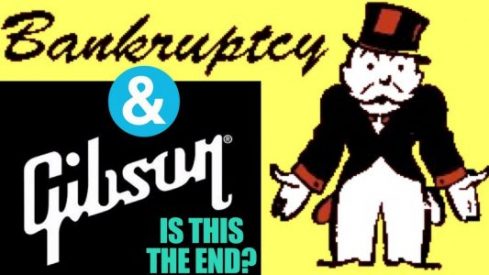Gibson files for bankruptcy with deal to renew guitar business
Gibson bankruptcy hits a Sour Note and Flat Chord. Investors are fretting about its billion-dollar debt load.
Gibson Brands filed for bankruptcy with a turnaround plan that will give some of the company’s lenders equity ownership of the iconic American business that’s supplied guitars to B.B. King, Elvis Presley and Pete Townshend.
A restructuring support agreement with senior secured noteholders will help it repay bank loans while going through a "change of control" transaction, according to papers filed Tuesday with its Chapter 11 bankruptcy in Delaware. The petition estimated up to $500 million in debt, and the lenders have agreed to an operating, or "debtor in possession," loan of up to $135 million to fund operations.
The change in control will give noteholders equity in a new company, replacing current stockholders such as Chief Executive Officer Henry Juszkiewicz. According to court filings, current noteholders include Silver Point Capital, Melody Capital Partners LP, and funds affiliated with KKR Credit Advisors. The restructuring will also allow the instrument business to "unburden" itself of a consumer-electronics unit that Gibson blamed for its financial woes.
Gibson, founded in 1894, sells more than 170,000 guitars annually in 80 countries. Its guitars are U.S.-made, with factories in Nashville and Memphis, Tennessee, and Bozeman, Montana. It also sells studio monitors, headphones, turntables and other musical instruments.
Exit Path
Its Gibson Innovations business, acquired in June 2014 from Koninklijke Philips NV, was the source of its financial woes, according to a court statement from Brian J. Fox, a managing director at Alvarez & Marsal who will serve as the company’s chief restructuring officer. Acquired through a leveraged transaction, the business faced significant sales declines due in part to a loss of credit insurance overseas.
With the noteholder agreement, the iconic company has "an exit path from Chapter 11 as a deleveraged business, poised for continued growth," Fox said in the filing.
Fox described the electronics business as having become "trapped in a vicious cycle in which it lacked the liquidity to buy inventory and drive sales." Cross-defaults had threatened the musical instruments business, and the company has been working with advisers since the fall of 2017 to try and solve the problem.
Before the filing, Gibson reached an arrangement with major constituents to its musical instruments business, but not the consumer electronics business, Fox said.



